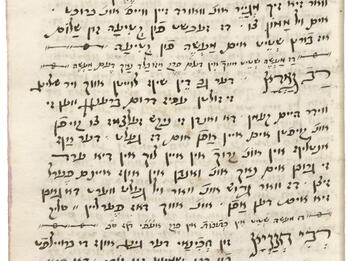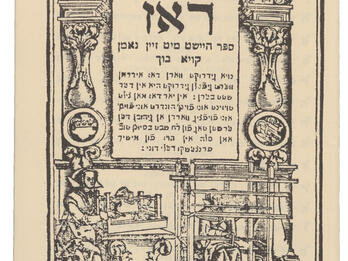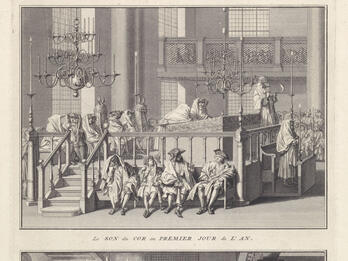Ayelet ahavim (Hind of Love)
And it came to pass, when they gathered to go, joyous in their departure and glad to run the course, the great God raised His voice, and the sound of thunder swiftly turned silent. All gave ear to the King’s word and heard His utterance speaking with the breath of His mouth, “O works of My hands, stand still and stir not! For your serenade offering is sweet to me. Comely are the cheeks that sing melodies, and lovely are the steps of your glorious magnanimous chariots. Stay here, do not run, for the day is still long. Today the Lord is manifest to make known, I will bring all dwellers of earth into judgment, and the deeds of every person will be called to account. I am satisfied when a man’s steps are firm, and a generous spirit will support the steps of the upright; his righteousness will support him. For My heart rejoices, for I do not desire a person’s death. But they have acted abominably and corrupted their ways; they traded their choice treasure for a dog’s price. Their eyes are too dim to see that there is a seeing eye above them. And now the time of their reckoning has come, to repay each according to his ways, for I know their heart, and the trace of their deeds is manifest before Me. I will contend with everyone who incites quarrel, and I abhor the way of a man of violence; may the stiff-necked melt like wax. But you who cleave to the Lord will not leave from here until I judge the nations, and the books of remembrances of the inhabitants of earth be unrolled in heaven. You are My witnesses; sit, My witnesses, faithful of My house, who are versed in law and judgment. I will reveal to you what has occurred to My mind, and you provide ample counsel concerning the turbulent depths of My judgments, so that you may suck your fill from the breast of My mysteries, O council of the upright and holy congregation!”
The word proceeded from the mouth of the King, and all the heavenly host stood above Him. To His right stood the troop of the holy people, those who perform His will; and circling on His left were thousands and thousands of celestial seraphim, mighty in strength. There stood the thrones of judgment to judge the utmost parts of the earth. Libraries of sealed books were opened, and they judged the peoples of the earth in truth and equity. It was a faithful judgment; a rich person was not preferred to a poor one, nor was the countenance of the poor exalted; the ways of the lesser were not concealed, nor were the deeds of the great hidden. Is anything hidden from the Lord? Shall a man dwell in the hidden parts and He not see it? Shall the cave of the fugitive or the secret cache not be known to Him? The eyes of the Observer are continually roaming over the land, supervising the windows of the firmament, peering through the slats of the heavens, surveying the celestial storehouses, sitting in wait, while the fruits of a man’s deeds and his judgment are concealed in the King’s archives. Woe to those who have not repaired their misdeeds, for they will find no refuge. Where can they flee to find help to escape from the trap? If they hide in the heights of heaven, there the Lord’s hand will prevail and seize him, and in the hidden hoards of the sand. The voice of the Lord will curse their days; they will fade and wither, all suffering shame and disgrace. Or if the wicked run and grab hold of the corner of His cloak, will He leave His garment in his hand and flee? Will He ride the heavens and depart? There they searched the bags of those who dwell under heaven. The judges inquired carefully; they searched the depths of the heart. And they emptied the laden sacks of those who came from the womb, and they found in the sack of Benjamin—father of many nations and head of the tribes of Israel—a cup filled with wine of salvation, his cup overflowing. His wheat was a broken heart, his grain was pure of heart. The Lord rejoiced in his deeds; he performed and prospered, and his many praises were topped by a book of his deeds.
Indeed, this is the man for whom we hoped, who drew the line of straightness and did not deviate to the right or the left. He arouses himself to hold fast to his innocence. He despises this world to fill his storehouses with bundles of life. Would that the heart of these uncircumcised be covered with brambles! They are drawn by the ropes of perdition, by the cords of injury and chains of scheming, drawing a fool, having enticed them and also vanquished them; they ate from his bread and lay in his bosom.1
Would that they awake from the sleep of the world and the vanity of its dreams! And if one soul sinned and slumbered in the embroideries of the world, but his heart was aroused and he awoke and his soul was empty, let him sate it from the bread of heaven, fill it from the oil of its house, and take its share for the hunger of the soul’s compartments. Would that they improve their ways, learning from the deeds of Abraham My lover, who exerted himself to walk on superior roads, on choice highways, and always trod goodly paths. He knows My power, for I, I am He, Creator of heaven, Lord over all the earth, sweeping away the camps of those who camp by the banner of wickedness and lean on the rod of their transgression.
And He brought them to the boundary of His holy site, to call all of them by My Name, the Lord, revealing My self-concealing reality, and that there is no other god with Me—teaching to revere Me, for I know their heart. I solve mysteries and search the recesses of the belly. His belly is full of the fruit of the tree of knowledge because he has been fully loyal to Me. He has sated his soul with clear discourses and has harvested also from the tree of life, who proclaims the name of Heaven and announced it in the world. He has eaten and will live forever.
Set your hearts, O My celestial angels, who fill My palace! Is there the like in all the provinces of the earth? Is such broad-heartedness as his manifested in the breadths of the earth or the heart of the seas? Is a spirit like his found in the four winds of the heavens? I have closely examined his innards and found them pure. I tried him with a temptation heavy to bear. His mouth and the utterance of his lips did not say, “I cannot bear it; I cannot undergo these for I am not experienced.”2 This was my command to him at the outset, to depart from among all the souls of his father’s house and the people of his birthplace. He must not stand before the unenlightened, who are like cut thorns and brambles in his side. His parents must not impart wretched ideas to him, and he must part from all scab-infested3 members of his family or friends from before and acquaintances from previously.
Even then, when he is in a land whose seeded gardens are not his, famine arising in all the borders of his sojourning, and fields not yielding produce, still he thinks no iniquitous thoughts to kick against his king like one of the good-for-nothings, but he engraves upon the tablet of his heart My word that drips like dew upon him, that I have spoken to him, My blessing that I send before you. When the famine pervades the land and he cannot linger there, he thought to go to the land of sown wheat, lest he and all that is his die, but he is sated there with humiliation, his pails are filled with bitters. They desired his wife, the bride of his youth; they coveted her beauty, they loved her radiance. She was taken to the house of the king; I smote him with plagues and did not allow him to touch her. Shall the rebellious princes stand in the city? Should the eyes of those men be gouged out? They saw his disgrace. And what did they want in his house in their midst?
He turned and departed from that place, to be tranquil and serene, but he was not serene when his nephew, who had accompanied him in leaving his father’s house, separated from him. The quarrel between their shepherds was not tranquil. Nor did he rest when he heard that [his nephew] was taken captive. He mustered his followers, few in number, against a mighty horde, and his heart was fortified because I was with him to rescue him. Every place that he sets foot, misfortune befalls him, evil pursues him. All the days of his sojourning, fear oppresses him round about; from inside and out, loss threatens him. A consort stands at his right, a humble handmaiden. She is thrust out and exiled, but she becomes a cornerstone, to raise up holy seed to him, a ripe shoot flourishing from his roots, for she who lay in his bosom and dwelt in his tent had grown old, and her years were passing.
But at the time that trembling seized him and a festering sore, and when he feared on account of his abating vigor, I established a covenant with him to circumcise his foreskin as a sign of the covenant, though it was painful for him to circumcise his flesh, and a grievous wound.
Yet more woe to add to his pain, and his troubles increased on that unfortunate day: a perverse and despicable act, for his tender sweetheart, who came under the shelter of his roof, was kidnapped. And as for the event being repeated twice, so was his pain for his flesh and blood increased. Yet I am with the last also, to frustrate sour plans, to bring down retribution on the head of the iniquitous.
His worries increased, to drive out the handmaid, after he had loved her and she had become a companion to him, to betray the house of those who loved him, and she was a friend to him. He was greatly aggrieved about the lad—for he was the first fruit of his strength—to send him to another land. All this was hidden from his eyes and he did not see it.
Despite all the troubles that befell him, joy girded him, for he was warmhearted, on account of the fire on which he breathes with the breath of his mouth, rejoicing when he sees that it came down from the Lord in heaven. He bore painful afflictions, but he did not sin with his lips. He rejoiced on the utterance of My decrees, passing judgment on life without hope, and withstood them all to stand in the lands of the living. For he surrendered everything he had to serve Me. His soul yearned to minister to Me; his ways were in every way well ordered, and his deeds successful, to perform the will of his Maker, the beloved of his eyes, and his eyelids were directed at Me.
Notes
[This sentence is rife with incongruous combinations driven by wordplay.—Trans.]
[Source citation in original: “Maimonides, Commentary to m. Avot Chapter 5,” probably referring to Maimonides’ enumeration of Abraham’s ten trials in his commentary to Avot 5:3.—Trans.]
[Another non sequitur motivated by wordplay.—Trans.]
Credits
Solomon de Oliveyra, Iggeret Ayelet ahavim (The Hind of Love) (Amsterdam: David de Castro Tartas, 1665). Republished as: Selomoh de Oliveyra, Sefer Ayelet ahavim = Ajelet Ahobim, ed. Abraham Kohen (Vienna: Holzinger, 1818), 12a–14b.
Published in: The Posen Library of Jewish Culture and Civilization, vol. 5.





